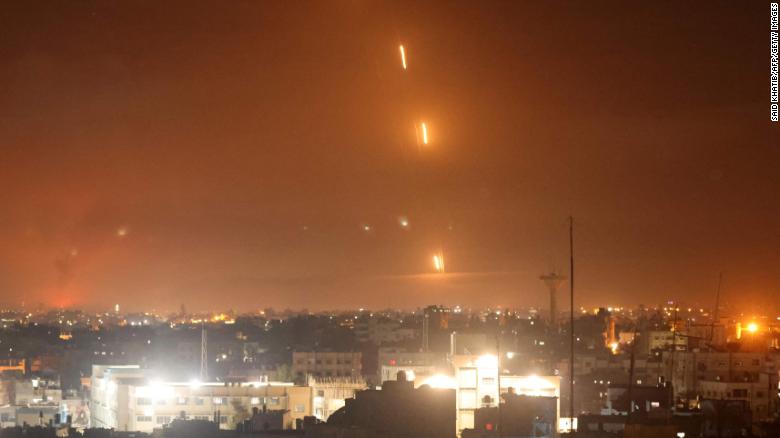Course Themes:
1. Why were many nation-states organized on the basis of ethnic identity? Did this do more to solve conflicts or create conflicts?
2. What conditions are necessary to end armed conflict and build a sustainable peace?
Israel and Palestine have always had some tension between them. Their religious differences have caused many issues, resulting in animosity between the two. It is important to understand the differences between the people of Israel and Palestine. Palestinians are Arabs, while Israeli are mainly Jewish but a small portion of them are Arabs. A few weeks ago, Palestinian protests at Jerusalem were met with force from the Israeli police, causing even more tension.
On Tuesday, the Hamas, or Palestinian militants, located in Gaza fired hundreds of rockets into Israel as a result of this aggressive response to Palestinian protests, causing many Israeli to get wounded or in some cases, die, although the numbers are not very high yet. As retaliation against these rocket launches, Israel has mounted what was considered the "largest strike since 2014" (IDF). Israel has begun to launch airstrikes on Gaza, causing massive destruction and 35 dead, with a few hundred wounded.
Many citizens have been forced to seek safety in missile shelters, and the missiles from both sides don't seem to be ending anytime soon. A 13 story building was struck down on Tuesday night by Israel for apparently being a place where the Hamas, a nationalist military organization based in Palestine, operated and communicated. Although the Israel Defense force, also known as the IDF, claimed that there was sufficient time since the warning was given to evacuate, some non militants were supposedly injured, and militants from Palestine promised to retaliate as a result, leading to more missile strikes from both sides.
Riots became common as a way to protest against the actions of the two nations. Israeli Arabs and Palestinians have rioted in Haifa and Lod, leading to further damage to property and 150 suspected rioters arrested. Israeli Jews were accused of stoning a Arab's car, while Israeli Jews were accusing the Palestinians and Israeli Arabs of burning synagogues and other places of worship, causing additional tension to build.
International communities have called for the de-escalation of the violence taking place, and accuse the Israeli police of abusing power against the Palestinian protesters in Jerusalem. Palestine and Israel both accuse each other of various atrocities, and many nations are denouncing Israel's aggressiveness towards the Palestinians and demand that equality be observed in Jerusalem and between the nations.
Discussion Questions:
1. What should the Palestinians have done as a response to the Israeli police's use of force in Jerusalem?
2. What happens when nations do not resolve their ethnic and religious differences?
Sources:
https://www.foxnews.com/world/israel-idf-hamas-gaza-strip-most-intense-since-2014
https://www.bbc.com/news/world-middle-east-57081848
https://www.cnn.com/2021/05/11/middleeast/israel-gaza-airstrikes-rockets-intl/index.html

Nations not solving their ethnic and religious differences or at the very least addressing them and changing policies to accommodate for it had pretty consistently led those that feel marginalized by their governments to form rebel groups and rise agains their nation or demand political change. They are usually met with brute force or repression from the government, and it quickly dissolves into chaotic and unorganized conflict between rival groups, sometimes with human rights violations and atrocities being committed by the group with more power. Sometimes, the government will persecute these groups even if they show no resistance or rebellion.
ReplyDeleteI really agree on what you are saying, I also think that if nations don't solve ethnic and religious differences it can cause groups to rebel against other groups or even the government. When problems like these arise many human rights are violated by the groups with more power and influence.
DeleteWhen nations don't solve their ethnic and religious differences it cause a lot of tension between the groups which eventually leads to a peak of anger and frustration. I think that nations should at the every least try to solve some problems between group differences because it can create many problems for the nation.
ReplyDeleteWhen nations don't solve their ethnic and religious differences it could lead to the minority groups feeling less and less represented and therefore having a lot of discontent of the government. This will potentially lead to revolts in the nation. It's important that nations make their minorities feel included and respected.
ReplyDeleteWhen nations don't resolve ethnic differences more and more chaos rises. It also makes certain smaller religions feel not welcome and even sometimes ignored. This could future lead to war or even what is happening now between Israel and Palestine, tension. Every ethnicity and culture has the right to feel loved, included, and welcomed, not given hate.
ReplyDeleteWhen nations are unable to solve their ethnic and/or religious differences it eventually leads to violence. Even if it starts out as prejudice between the two factions, that prejudice if left alone breeds violent action towards both sides, which can eventually lead to full on conflicts as demonstrated by the Israel-Palestine Crisis.
ReplyDeleteWhen nations are unable to resolve ethnic/ religious differences tensions rise. In many cases, it eventually leads to violence. No only will this affect the nation's government but it also greatly impacts the citizens and individual people within the nations. I think this is clearly demonstrated in the Israel-Palestine Crisis. In addition I think it is important we see that the conflict is within the governments of the two countries and not between the citizens.
ReplyDeleteWhen nations are unable to resolve ethnic and religious differences, tensions can arise leading to violence. In addition, it can also cause those people to not feel welcomed or feel included.
ReplyDelete